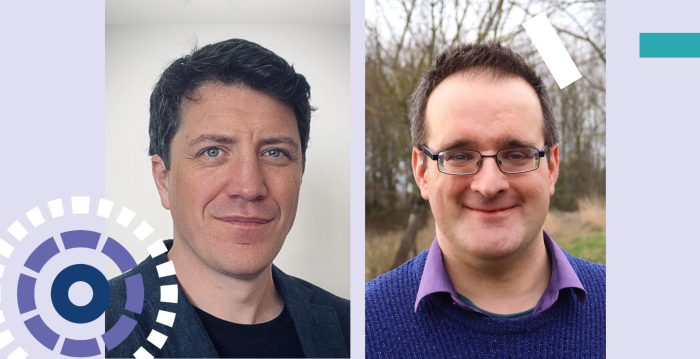ARC East of England researchers are leading several collaborative studies working with people who have lived experience of cystic fibrosis to better understand their treatment preferences to improve their quality of life.

ARC East of England's Dr. Rory Cameron (pictured left) and Dr. Adam Wagner (pictured right)
Cystic fibrosis (CF) affects over 10,000 people in the UK, and the average life expectancy for someone with CF is around 49 years. Patients typically spend more than 1.5 hours every day taking multiple treatments to keep their lungs stable and prevent chest infections. This makes routine activities more difficult and limits social activity, impacting their quality of life. Reducing this treatment burden was the top research question people with CF listed in a 2017 James Lind Alliance study.
The ARC East of England’s (ARC EoE) Measurement in Health and Social Care Theme Lead, Dr. Adam Wagner, and Dr. Rory Cameron are supporting two major CF studies addressing this research question. The VALU-CF study was designed to quantify the impact of the treatment burden and measure its impact on overall quality of life, as this has previously been omitted when evaluating new treatments, including Kaftrio, which became available in the UK in 2020. This treatment has transformed the lives of many people with CF, improving lung function and reducing hospital admissions. Kaftrio treats the underlying protein defects in CF and can reduce the need for other common treatments, which are time-consuming and harder for people to manage.
"So far, our work has shown that while people with CF would like to improve their life expectancy, they are willing to trade some therapeutic benefits to lessen the burden of their treatment. Our projects aim to broaden the understanding of individual treatment preferences, understand the economic impact of new treatment approaches, and establish new methods for CF health economic work."
Dr. Adam Wagner, Measurement in Health and Social Care Theme Lead
The ARC EoE team also leads the health economic components of the national CF-STORM trial with Alder Hey Children’s NHS Foundation Trust and Great Ormond Street Hospital, investigating whether people taking Kaftrio can safely stop nebulised medicines, saving considerable time and treatment burden. Alongside this work, in a follow-up to the VALU-CF study, the team is looking at how research priorities for patients have changed since Kaftrio launched and the difference in perspectives between people taking this drug and those who do not benefit (10% of the CF population with certain genetic variations.)
The team is also contributing to the YOGA-CF study, which builds on previous research to investigate whether online yoga classes can help CF patients with physical issues like pain and breathlessness, as well as mental health issues such as anxiety and overall wellbeing.
"The overarching goal of these studies is to identify the most effective and cost-effective treatments to support clinical decision making, and plan services. Given the significant impact of these choices on individuals with CF and their families, it is important that their priorities are appropriately considered.
Dr. Rory Cameron, Researcher in Measurement in Health and Social Care
Rory added: "In the UK, CF treatment decisions are typically made collaboratively between patients and their clinical teams. So understanding treatment preferences can not only support personalised care, but can also contribute towards the development of new treatments and services, prioritising those that deliver the outcomes most valued by the CF community."
These studies are funded by the National Institute for Health and Care Research (NIHR). ARC EoE has provided funding for the second phase of the VALU-CF study, as well as ongoing administrative and training support to the researchers and help to share research findings. Our team is working closely with the Liverpool Clinical Trials Centre, Alder Hey Children’s NHS Foundation Trust and the Royal Brompton Hospital. They are also partnering with the UK Cystic Fibrosis Registry for key data and data linkage and the Cystic Fibrosis Trust to consult their patient association and support patient and public involvement work in developing protocols and materials for these studies.
People with cystic fibrosis helped to shape this research and continue to steer and inform the projects, contributing to the design of studies and protocols. All studies have a person with CF (or a parent of a child with CF) on their steering committees to provide patient perspectives at all stages from data collection to interpretation of the results.
"One of the single biggest impacts of CF on my wellbeing is the time it takes to complete all of my treatments. Reducing this burden will have a huge impact on my overall quality of life, giving me valuable time back! So trials such as YOGA-CF and CF STORM are very exciting and of huge importance to me and many others with CF.”
Person with cystic fibrosis
Expected to conclude this summer, with initial results anticipated for late autumn, CF-STORM is one of the largest ever CF trials conducted in the UK, with over 590 participants. The value of the study has been recognised internationally, having been presented and discussed for several years running at international CF conferences, as well as sparking debate in leading academic journals about the likely impact of its findings. Researchers hope that CF-STORM will generate the evidence needed for many people to safely stop time-consuming and difficult nebulised CF therapies.
Data from the first phase of VALU-CF were used in the National Institute for Health and Care Excellence (NICE) evaluation, which led to approval for modulator drugs Kaftrio, Symkevi, and Orkambi, which treat the root cause of CF, to be available within the NHS from 2024, as reported in this BBC article.
The team will also be encouraging as many people as possible to participate in the next phase of the VALU-CF survey over the coming months.
Further resources
- The CF STORM Trial: A trial investigating the effects of stopping nebulised therapies for people on Kaftrio
- YOGA-CF: A trial investigating the effects of yoga for adults with cystic fibrosis
- VALU-CF Study: Evidence-based valuation of patient-centred outcomes in Cystic Fibrosis and Evidence-based valuation of patient-centred outcomes in Cystic Fibrosis II
- The Cystic Fibrosis Trust website also links to ARC EoE research projects for CF



